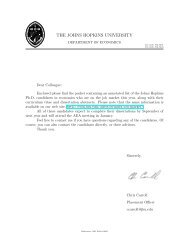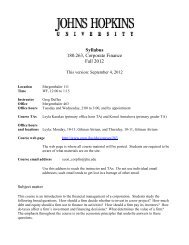WEALTH, DISPOSABLE INCOME AND CONSUMPTION - Economics
WEALTH, DISPOSABLE INCOME AND CONSUMPTION - Economics
WEALTH, DISPOSABLE INCOME AND CONSUMPTION - Economics
You also want an ePaper? Increase the reach of your titles
YUMPU automatically turns print PDFs into web optimized ePapers that Google loves.
ABSTRACT<br />
The author develops a measure of aggregate private sector wealth in<br />
Canada and examines its ability to explain aggregate consumption of nondurables<br />
and services. This wealth measure includes financial, physical<br />
and human wealth.<br />
The author measures human wealth as the expected present value<br />
of aggregate labour income, net of government expenditures, based on a<br />
discrete state-space approximation of an estimated bivariate vector autoregression<br />
for the real interest rate and the growth rate of labour income, net<br />
of government expenditures. His general approach to measuring financial<br />
and physical (non-human) wealth is to consolidate the assets and liabilities<br />
of the various sectors of the economy so as to measure the net worth of the<br />
ultimate owners of private-sector wealth – households. To the extent possible,<br />
the author measures non-human wealth at market value.<br />
The relationship between consumption and wealth is explored as a<br />
means both of gauging the usefulness of the wealth measures developed in<br />
this report and of improving on empirical consumption models for<br />
Canada. The principal empirical finding is that both wealth and disposable<br />
income are important determinants of consumption. Including wealth in<br />
the consumption function is particularly helpful in explaining the consumption<br />
boom of the late 1980s.<br />
vii




